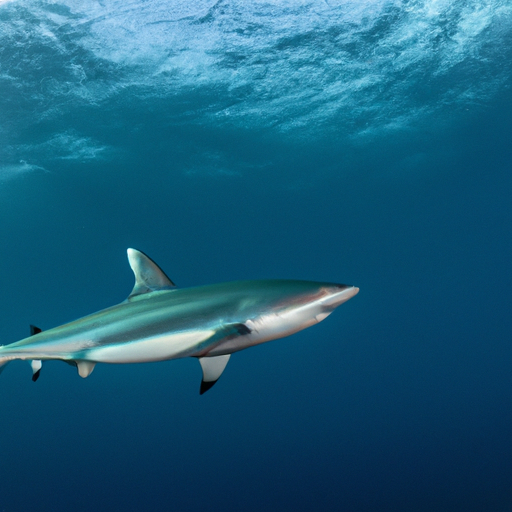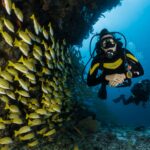Picture this: the crystal clear turquoise waters of the Mexican coastline capturing your attention, the sun warming your skin as you board a boat, ready for an adrenaline-fueled adventure. But hold on! Something unexpected has happened. Mexico recently imposed a ban on shark diving, leaving adventurers and eco-tourism enthusiasts wondering why. In this article, we will explore the reasons behind Mexico’s surprising decision, shedding light on the potential impacts on both the local marine ecosystem and the growing tourism industry. So grab your snorkels and dive into the depths of this captivating tale.

Background on Shark Diving Industry
Growth of shark diving tourism
Shark diving tourism has experienced significant growth in recent years, driven by the allure and fascination surrounding these majestic creatures. As more individuals seek out unique and thrilling experiences, shark diving has become a sought-after activity. The opportunity to come face-to-face with these apex predators in their natural habitat has attracted adventure-seekers from around the world.
Ecological importance of sharks
Sharks play a crucial role in maintaining healthy marine ecosystems. As top predators, they regulate the population of species lower in the food chain, helping to maintain balance and promote biodiversity. Additionally, sharks contribute to the health of coral reefs by controlling the populations of herbivorous fish that could otherwise overgraze on the reefs.
Concerns raised by conservationists
Conservationists have long expressed concerns about the impact of shark diving on the behavior and well-being of these animals. The growing popularity of shark diving has raised questions regarding the potential negative consequences for both the sharks themselves and the marine environments they inhabit. It is important to carefully evaluate and address these concerns to ensure the long-term sustainability of shark tourism.
Negative Impacts of Shark Diving
Disturbing natural behavior
One of the key concerns surrounding shark diving is its potential to disrupt the natural behavior of these creatures. The presence of divers and the accompanying noise and activity can disturb their natural feeding, mating, and migratory patterns. This disturbance may lead to significant stress among the sharks, affecting their overall well-being and ability to fulfill their ecological roles.
Alteration of feeding patterns
Shark diving operations often use bait or chum to attract sharks, which can significantly alter their natural feeding patterns. By conditioning sharks to associate humans with food, it can disrupt their normal foraging behavior and dependency on natural food sources. This alteration in feeding patterns may have ripple effects throughout the marine ecosystem, impacting not only sharks but also the organisms that rely on them for food.
Increase in aggressive behavior
The repetitive exposure of sharks to divers can potentially lead to an increase in aggressive behavior. The sharks may become conditioned to associate divers with a source of food, leading to more frequent close encounters and potential confrontations. This behavioral change poses risks to both the divers and the sharks themselves, as it can potentially lead to injuries or fatalities.
Risk of injury or death
Shark diving inherently carries a certain level of risk, as it involves close proximity to these powerful predators. Despite the precautions taken by operators, accidents can still occur. Incidents of divers being bitten, attacked, or even killed by sharks have been reported, highlighting the potential dangers associated with shark diving activities.
Environmental damage
The increased human presence associated with shark diving can result in environmental damage to the fragile marine ecosystems. Anchoring boats, littering, and improper disposal of waste can all have detrimental effects on the surrounding environment. Additionally, the use of dive cages and other infrastructure may disrupt the natural habitats of marine organisms, further impacting the delicate balance of the ecosystem.
Incidents and Accidents
Shark attacks on divers
While shark attacks on divers are relatively rare, they do occur. These incidents often garner significant media attention and can create negative perceptions of sharks and the diving industry as a whole. While the number of attacks is small compared to the millions of people who engage in shark diving activities, any incident can have a lasting impact on public perception and the reputation of the industry.
Fatalities and injuries
Tragically, there have been cases where shark diving has resulted in fatalities and severe injuries. These incidents highlight the inherent risks involved in engaging with wild animals, particularly those as powerful and unpredictable as sharks. While safety protocols are in place, accidents can still happen, emphasizing the need for constant vigilance and risk management.
Negative publicity
When accidents or incidents occur in the shark diving industry, they can generate negative publicity that tarnishes the image of the entire industry and deters potential tourists. Media coverage of attacks or fatalities may perpetuate the perception of sharks as ruthless killers, leading to fear and misunderstanding among the general public. This negative publicity can have far-reaching consequences for both the diving industry and the conservation efforts aimed at protecting these creatures.
Conservation Measures Implemented
Marine Protected Areas
To mitigate the negative impacts of shark diving, the establishment of marine protected areas (MPAs) has been an important conservation measure. These MPAs aim to restrict certain activities, including shark diving, in designated areas to protect the natural habitats and behavior of sharks. By implementing strict regulations, MPAs can safeguard sharks and their ecosystems, allowing them to flourish undisturbed.
Shark conservation projects
Conservation organizations and research institutions have initiated various projects dedicated to the conservation and protection of sharks. These projects involve scientific research, population monitoring, and promoting responsible interaction with sharks. By understanding the behavior and ecological needs of sharks, conservationists can develop effective strategies for ensuring their survival and the long-term health of marine ecosystems.
Educational initiatives
Raising public awareness and promoting education about sharks and the importance of their conservation is crucial for sustainable shark tourism. By providing accurate information about sharks’ behavior, impact on the ecosystem, and the risks associated with irresponsible diving practices, educational initiatives can foster a better understanding and appreciation of these apex predators. Knowledge empowers individuals to make informed choices and engage in responsible tourism practices.
Development of responsible tourism
In response to the concerns raised by conservationists, the shark diving industry has been making efforts to adopt more responsible practices. This includes working closely with conservation organizations, adhering to strict codes of conduct, and developing guidelines for sustainable interactions with sharks. By prioritizing safety, environmental stewardship, and conservation efforts, responsible tourism seeks to minimize negative impacts and promote the long-term survival of sharks.

Mexico’s Decision to Ban Shark Diving
Evaluation of the situation
The decision to ban shark diving in Mexico was the result of a comprehensive evaluation of the industry’s impacts and the concerns raised by conservationists. It involved the examination of scientific research, public consultation, and consideration of the long-term sustainability of both the tourism industry and the shark populations.
Public consultation and input
Public input and consultation played a vital role in Mexico’s decision to ban shark diving. Stakeholders, including conservation organizations, local communities, and industry representatives, were invited to share their perspectives and concerns regarding shark diving. This collaborative approach helped ensure that the decision took into account the diverse interests and concerns of all relevant parties.
Consideration of scientific research
Scientific research played a crucial role in providing evidence-based insights into the ecological impacts of shark diving. By evaluating the findings of studies on the behavior, feeding patterns, and overall well-being of sharks, Mexico was able to make informed decisions that balanced the interests of tourism and conservation.
Balancing tourism and conservation
Mexico’s decision to ban shark diving reflects the country’s commitment to striking a balance between tourism development and the preservation of its natural resources. By prioritizing the long-term health of shark populations and marine ecosystems, Mexico has taken proactive steps to ensure that future generations can continue to enjoy and benefit from these valuable natural resources.
Internal and external pressures
Internal pressures, such as concerns from local communities and conservation organizations, likely played a significant role in Mexico’s decision. Additionally, external pressures, such as international scrutiny and the potential impact on the country’s reputation as a tourist destination, may have influenced the decision-making process. Balancing these pressures while prioritizing ecological sustainability was undoubtedly a challenging task.
Arguments in Favor of the Ban
Preserving natural behavior
One of the key arguments in favor of the ban is the preservation of sharks’ natural behavior. By eliminating the constant presence of divers and the disturbance associated with shark diving activities, Mexico aims to allow sharks to exhibit their natural behaviors, mating rituals, and feeding patterns without interference. This preservation offers valuable insights into the complex interactions within marine ecosystems.
Protecting shark populations
The ban on shark diving is intended to protect shark populations from potential harm. By reducing disturbances and eliminating the potential for injuries or fatalities, sharks can thrive in their natural habitats and fulfill their ecological roles. This protection is crucial for maintaining the overall health and balance of marine ecosystems, which depend on the presence of sharks.
Maintaining ecosystem balance
Shark populations play a vital role in maintaining the balance and diversity of marine ecosystems. By removing the disruptions caused by shark diving, Mexico hopes to ensure the continued regulation of prey populations and the preservation of delicate ecological relationships. Maintaining ecosystem balance is crucial for the long-term sustainability of marine environments and the well-being of all organisms within them.
Ensuring safety of divers
The ban on shark diving aims to promote the safety of divers and minimize the risks associated with close encounters with sharks. While the industry implements safety measures, accidents can still occur. By eliminating the direct interaction between sharks and divers, potential injuries and fatalities can be significantly reduced, ensuring a safer environment for both humans and sharks.
Promoting sustainable tourism
The ban on shark diving in Mexico aligns with efforts to promote sustainable tourism practices. By prioritizing the long-term protection of sharks and their habitats, Mexico sends a strong message about responsible tourism and the importance of conservation. This approach not only safeguards the natural environment but also enhances the country’s reputation as a destination that values its natural resources.

Arguments Against the Ban
Negative impact on tourism revenue
Opponents of the ban argue that it will have a negative impact on tourism revenue, particularly in regions where shark diving is a significant attraction. The presence of sharks and the opportunity to engage with them draws tourists, contributing to local economies. They argue that with proper regulations and responsible practices, the economic benefits of shark diving can outweigh the potential ecological concerns.
Loss of employment opportunities
Banning shark diving can result in the loss of employment opportunities for those directly involved in the industry, including diving operators, guides, and support staff. These individuals rely on the tourism revenue generated by shark diving for their livelihoods. Critics argue that alternative solutions, such as stricter regulations and improved training, could address the concerns raised without completely eliminating the industry.
Alternative solutions proposed
Opponents of the ban propose alternative solutions that can mitigate the negative impacts of shark diving without resorting to a complete prohibition. They suggest implementing stricter regulations, limiting the number of divers allowed at a given time, and improving safety protocols. These measures seek to ensure the protection of both sharks and divers while still allowing for the continuation of shark diving activities.
Experiences of other countries
Critics of the ban point to the experiences of other countries that have successfully managed shark diving operations without resorting to a full ban. These countries have implemented strict regulations, established marine protected areas, and invested in conservation programs to mitigate the potential negative impacts. They argue that Mexico could adopt similar measures to ensure the sustainability of its shark diving industry.
Role of effective regulations
Opponents of the ban emphasize the importance of effective regulations in managing the shark diving industry. They argue that by implementing stringent guidelines, enforcing compliance, and providing proper training for operators and divers, the negative impacts can be minimized. They believe that well-regulated shark diving can coexist with conservation efforts and provide economic benefits while ensuring the safety and well-being of sharks.
Reactions and Implications
Responses from diving industry
The ban on shark diving in Mexico has elicited varied responses from the diving industry. While some operators and businesses express disappointment and concern over the potential loss of revenue, others acknowledge the need for conservation measures. Many operators have shifted their focus to other diving attractions or adapted their business models to promote responsible ecotourism. Overall, the industry acknowledges the importance of preserving shark populations and finding sustainable alternatives.
Opinions of conservation organizations
Conservation organizations generally support Mexico’s ban on shark diving as a crucial step toward protecting sharks and marine ecosystems. These organizations view the ban as a positive development for long-term conservation efforts and the preservation of biodiversity. They emphasize the importance of collaboration between conservation organizations, governments, and the diving industry to ensure the effective implementation of sustainable practices.
Effects on local communities
The ban on shark diving can have both positive and negative effects on local communities. While it may result in the loss of employment opportunities for some individuals involved in the industry, it can also open up new avenues for sustainable tourism and economic development. The long-term benefits of preserving healthy ecosystems and promoting responsible tourism can contribute to the overall well-being and resilience of local communities.
Potential for illegal shark diving
Critics of the ban express concerns about the potential for illegal shark diving activities to arise in the absence of regulation. They argue that banning shark diving may drive the industry underground, making it difficult to monitor and enforce necessary conservation measures. Education and awareness campaigns, along with robust enforcement and penalties for illegal activities, are crucial to address this potential issue.

Lessons from Mexico’s Ban
Importance of stakeholder collaboration
Mexico’s ban on shark diving emphasizes the importance of collaboration among stakeholders, including conservation organizations, governments, local communities, and the diving industry. By engaging all relevant parties in discussions and decision-making processes, a more holistic approach to balancing tourism and conservation can be achieved. Collaboration fosters understanding, encourages innovative solutions, and ensures the long-term sustainability of both the industry and the natural resources it relies on.
Need for comprehensive research
Mexico’s decision to ban shark diving shows the significance of relying on comprehensive research to inform conservation measures. Scientific studies on shark behavior, ecological impacts, and human-shark interactions provide valuable insights that can guide decision-making processes. Continued research is essential in shaping effective policies and regulations that consider the complexities of marine ecosystems and the needs of both sharks and human stakeholders.
Balancing economic benefits and conservation
The ban on shark diving in Mexico raises important questions about the delicate balance between economic benefits and conservation. Finding sustainable alternatives to generate revenue while ensuring the protection of shark populations requires careful planning and collaboration. A balanced approach that combines responsible tourism practices, effective regulations, and ongoing conservation efforts can maximize economic benefits while safeguarding the long-term health of marine ecosystems.
Development of sustainable alternatives
Mexico’s ban on shark diving highlights the need for the development of sustainable alternatives that can provide economic opportunities while minimizing ecological impacts. This includes diversifying the tourism offerings in affected regions, promoting responsible ecotourism, and investing in alternative industries. By exploring innovative and sustainable solutions, local communities can continue to thrive while safeguarding the natural resources that contribute to their prosperity.
Effectiveness of government interventions
Mexico’s ban on shark diving demonstrates the role of government interventions in addressing conservation concerns. Governments play a crucial role in establishing regulations, monitoring compliance, and enforcing penalties for non-compliance. Their actions shape the framework within which the tourism industry operates, highlighting the need for effective governance, transparent decision-making, and a proactive approach to sustainable tourism.
Conclusion
Mexico’s ban on shark diving reflects the country’s commitment to balancing tourism development and the preservation of its rich natural resources. Considering the negative impacts of shark diving on shark behavior, ecosystems, and safety risks for divers, Mexico made a decision based on scientific research, stakeholder input, and careful evaluation of the long-term sustainability of both tourism and shark populations.
The ban has far-reaching implications, not only for Mexico but also for the global shark tourism industry. It raises important questions about the need for responsible tourism practices, comprehensive research, and collaborative efforts among stakeholders. The lessons learned from Mexico’s ban can shape the future of shark tourism, promoting sustainable alternatives, preserving natural behavior, protecting shark populations, and ensuring the well-being of both humans and sharks. By striking a harmonious balance between economic benefits and conservation, the future of shark tourism holds promising prospects that offer both exciting experiences and environmental stewardship.

- Can You Dive With Sharks In California? - August 19, 2023
- What Are The Rules Of Shark Cage Diving? - August 19, 2023
- Where In Florida Can You Dive With Sharks? - August 19, 2023








